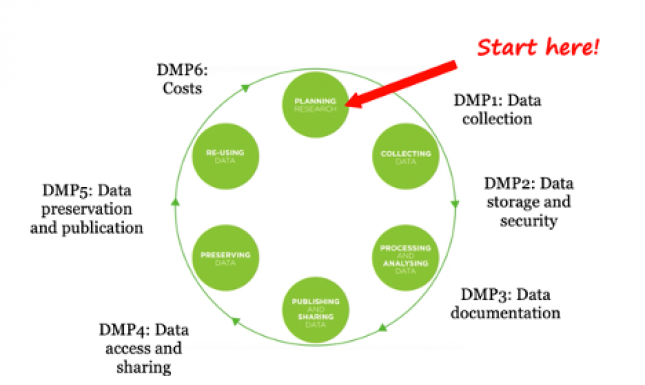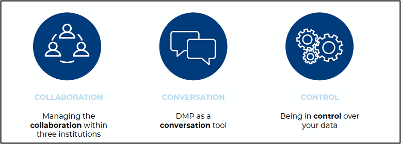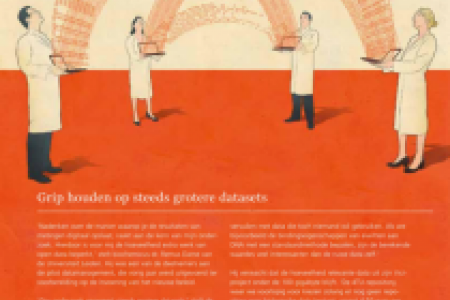Funders agree that great data management starts with a good plan
Are you starting a new research project funded by NWO or ZonMW? From January 2021 onwards, you can use Leiden University’s template to write your data management plan.
Over the years, the Leiden University Libraries, and then the Centre for Digital Scholarship, have updated the Leiden University data management plan (DMP) template according to Science Europe’s Guide to the International Alignment of Research Data Management and to other international developments. Most recently, in January 2021, the Dutch Research Council, NWO, and the Netherlands Organisation for Health Research and Development, ZonMW, have agreed that DMPs written following the Leiden University template provide all the information they need to assess whether the funded project adheres to their data management policies and leads to FAIR data.
Researchers funded by NWO and ZonMw and who are therefore required to submit a DMP to their funder, can now choose to use either the Leiden institutional template or the template provided by NWO or ZonMW.
The most recent Leiden DMP template is found in Zenodo, along with a Tips & Tricks document which gives some advice about how to answer the questions.
Why are data management plans useful?
Data management plans have been used for decades to plan complex technical projects. In the last couple of years, research funders have embraced data management plans for all disciplines as an instrument to get more insight into the data that are created in research projects and to enable the potential reuse of these data in follow-up research.
From their origins as an informal checklist, DMPs have become a mandatory part in the administrative work for newly-funded research projects. For some funders (e.g. NWO), a DMP must be submitted before the project can start, for others (e.g. the EU) it is a deliverable required within six months of the start of the project.
DMPs describe in more detail the plans for handling data that have been outlined in the project proposal. The aim of a data management plan is basically twofold: to ensure that data is protected from loss or unauthorised access, and to prepare for use of the data beyond the original project.


How are data management plans designed?
The structure of DMP templates usually follows the research data life cycle (see figure 1) and describes the steps taken during data management, from collecting, processing and analysing, towards publishing and preserving research results.
Templates guide the researcher through the process of planning and describing their data management decisions with questions like:
- Is storage space available for the volumes you will create?
- Did you agree with your partners on when, how, and with whom you share your data?
- What information do your peers need to understand your data?
- Where will your data be found after your project finishes?
Why we encourage you to take your DMP seriously
Much has been said and written about the burden, and the benefits, of writing DMPs but the fact is that more and more researchers have become aware of data management issues since it has become a mandatory step when collecting new data.
Leiden University’s grant-writing advisers have clearly seen evidence that the requirement to reflect on data management in an early stage is beneficial to project proposals. Furthermore, DMPs contribute concretely to the transition towards Open Science.
What do researchers think about DMPs and data sharing?
Over the years, the data management team at the Centre for Digital Scholarship (CDS) has reviewed and discussed hundreds of DMPs written by PhD students in the context of following courses delivered by CDS collaboratively with research institutes across Leiden University.
Students in the early phase of a PhD are often surprised to find that research data underlying a publication is not available. Most find it a logical step to share their research data as soon as they publish their findings. Some mention the ethical responsibility towards their participants to make sure that the information they provide is beneficial for future research and society. Of course, those dealing with personal data have concerns about how to comply with European GDPR rules that require the protection of people’s personal data. The data management plan can help students and researchers think about how to “be as open as possible and as closed as necessary.”
During our taught courses, students are asked to present the challenges of managing data for their research projects, and then reflect on the process of writing a DMP. Almost all find it a helpful exercise that made them aware of issues they hadn’t thought about before.
Recently, a student nicely summarized the benefits of writing a DMP in three ‘C’s:
- Collaboration: the DMP as an instrument to make agreements with the partners in the project.
- Conversation: the DMP as a tool to start discussing ideas related to research data.
- Control: the DMP as a way to feel more in control of their own project.

Figure 2: The benefits of writing a DMP, by Laura Schrauwen.
Help and advice
Funders require you to contact local data management support staff for advice on your DMP. The data management team at the Centre for Digital Scholarship can help you to find the solutions that best fit your research.
- You can contact us at any time for one-to-one advice and feedback on your DMP or to participate in one of the workshops we run on writing DMPs
- To write a DMP, use the latest Leiden University template and our Tips & Tricks
- Read more about data management, use the checklist, and read the FAQs on our webpages.





